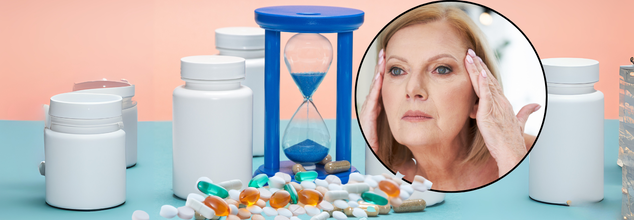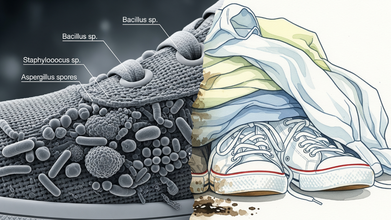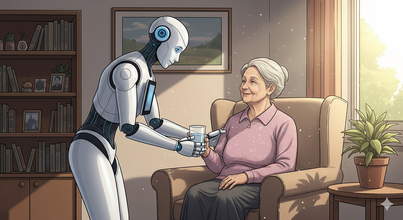- Health Conditions A-Z
- Health & Wellness
- Nutrition
- Fitness
- Health News
- Ayurveda
- Videos
- Medicine A-Z
- Parenting
- Web Stories
Could Anti-Ageing Drugs Be Shortening Your Life Span?

Credits: Canva
It starts innocently enough. Maybe it’s a wrinkle forming at the edge of your eyes or the first sign of aching joints after a long day. For many, ageing creeps in slowly, until one day, it becomes the loudest voice in the mirror. The desire to hold on to youth—to remain vibrant, sharp, and wrinkle-free—has fueled a booming global market of anti-ageing solutions. From collagen powders and NMN capsules to calorie-mimicking compounds, anti-ageing drugs and supplements promise to slow time’s march forward.
But here’s the uncomfortable question: What if your quest to look or feel younger is silently speeding up your biological decline? As the anti-ageing industry grows, medical experts warn that some of these interventions might come with unintended, even dangerous, consequences.
The answer is complex. While some anti-ageing drugs and supplements may offer genuine health benefits, others carry hidden risks, especially when used unsupervised or in combination with other medications.
Whether it’s reversing wrinkles, easing joint pain, or stimulating a sluggish metabolism, anti-ageing drugs are now everywhere. The global market for these supplements and therapies is set to skyrocket over the next decade. But effectiveness aside, there’s growing concern over how these substances interact with the body’s internal systems—especially when taken without medical guidance.
The term "anti-ageing" itself is increasingly under scrutiny. It suggests a battle against the inevitable. As a prominent U.S. beauty magazine, acknowledged in its decision to ban the term from its editorial vocabulary, the phrase carries unrealistic and potentially harmful connotations. Instead, terms like "healthy ageing" or "pro-ageing" are gaining ground—offering a more balanced and science-based lens to look at ageing gracefully.
We spoke to experts to discuss the real and potential reasons about the why and how of anti-ageing drugs and their effect on the human body.
Why Are Anti-Ageing Drugs So Popular?
Anti-ageing treatments encompass a wide range of products: from over-the-counter creams and oral supplements to prescription medications and injectable therapies. Popular compounds include antioxidants like glutathione and vitamin C, hormonal agents such as testosterone and growth hormone, and metabolic modulators like metformin and rapamycin. Many of these are marketed with bold claims—promising not just cosmetic improvements, but also enhanced vitality and longevity.
The science behind some of these products is promising. For example, metformin, a drug widely used for diabetes, has been shown in some studies to reduce inflammation, slow organ decline, and lower the risk of age-related diseases. However, the evidence that it—or any other anti-ageing drug—can reliably extend human lifespan remains inconclusive.
Do Anti-Ageing Drugs Mimic Caloric Restriction?
Many anti-ageing drugs work by mimicking caloric restriction or altering key metabolic pathways, a mechanism known to extend lifespan in lab animals. But this doesn’t mean they’re risk-free for humans, especially those with underlying conditions.
“Some anti-ageing drugs change the manner in which the body uses energy, similar to the effect of consuming fewer calories,” explains Dr. Vinay Aggarwal, Past National President of the Indian Medical Association. “While this will cause good ageing, it may put additional stress on the heart, especially in adults with pre-existing illnesses. The heart may be forced to labor harder or evolve to accommodate new energy demands, which may lead to fatigue, weakness, or arrhythmia in some individuals.”
In short, while these drugs may slow down some processes associated with ageing, they might also increase cardiovascular workload—potentially raising the risk of heart complications in certain users.
What Red Flags Should You Watch for When Self-Medicating?
The trend of self-medicating with anti-ageing supplements is growing, but it can be dangerous. Beyond prescription drugs, many people turn to over-the-counter anti-ageing supplements with little medical oversight. This self-medicating trend can pose a serious health threat.
“Individuals who use anti-ageing supplements without consulting a physician ought to be watchful for symptoms such as persistent fatigue, insomnia, dizziness, rapid heartbeat, or stomach upset,” warns Dr. Aggarwal.
“Mixing various supplements also elevates risks to overall health. If one starts to feel sick or notices some strange change since beginning such products, they should consult a physician immediately.”
The lack of regulation in the supplement industry means consumers are often unaware of what they’re ingesting—or how it interacts with other medications or pre-existing conditions.
Dr. Aggarwal shares that these warning signs may indicate that the body is not responding well to the supplement. He also cautions that mixing various supplements increases health risks, and if you start to feel unwell or notice unusual changes after beginning such products, it’s crucial to consult a physician immediately.
Could Anti-Ageing Drugs Destabilize Your Cardiovascular System?
The cardiovascular system is particularly vulnerable to the effects of anti-ageing drugs. Dr. S.S. Sibia, Cardiologist & Director at Sibia Medical Center, Ludhiana, explains, "“Hormonal, metabolic, or cellular repair agents may sometimes produce an undesirable effect on blood pressure control or stress-induced heart function."
“Uncontrolled use, especially in those with underlying conditions, can lead to disruption of autonomic balance or vascular function, precipitating risks like hypertension or hypotensive attacks.”
The mechanisms behind these risks are still being studied, but early research indicates that these compounds can disrupt the heart’s electrical signaling or alter vascular tone, both of which are critical to stable blood pressure and rhythm.
“Some anti-aging therapies can interfere with cellular energy metabolism or signaling pathways that control heart function,” Dr. Sibia adds.
“This can be interfering with the electrical signal of the heart or changing constriction of blood vessels. Thus, some people might develop irregular heart rhythms or changes in blood pressure, particularly with long-term or unmonitored therapy.”
How Do Dermatologists Evaluate the Side Effects of Anti-Ageing Drugs?
Beyond the heart, the skin and other organs can also be affected by anti-ageing treatments. Dr. Chandani Jain Gupta, MBBS & MD, Dermatologist & Aesthetic Physician at Elantis Healthcare, New Delhi, explains that side effects are assessed through clinical trials, dermatology tests, and ongoing post-launch monitoring.
In the dermatology world, anti-ageing topicals—ranging from retinoids to hormone creams—have long been popular. But even here, caution is advised.
“Side effects are evaluated on clinical trials, dermatology tests, and post-launch monitoring,” says Dr. Chandani. “Common issues include irritation, pigmentation, or potentially systemic impact. Safety profiles are dependent upon dosage, duration, patient profile, and ingredient interaction.”
With long-term usage, the skin might not always respond positively—especially with unregulated or steroid-infused products.
“The safety line is the point at which benefit is greater than risk,” Dr. Gupta adds. “Long-term products must be okay’d by dermatologists, clinically proven, and contain no harmful ingredients like steroids or unregulated hormones. Regular skin checkups and halting at signs of unfavorable reaction guarantee safety.”
A major challenge with anti-ageing supplements is the lack of stringent regulation. Unlike prescription drugs, many supplements are not subject to rigorous safety or efficacy testing before reaching consumers. This opens the door to contamination, inaccurate dosing, and potentially dangerous interactions with other medications. Introducing multiple supplements at once can create a “pharmacological pandora’s box,” increasing the risk of adverse reactions and drug interactions.
Diet vs. Drugs: Is There a Safer Path to Healthy Ageing?
Emerging research suggests that lifestyle factors—especially diet—may have a more profound and safer impact on ageing than drugs alone. Dietary patterns, particularly protein and energy intake, can influence cellular health and longevity more fundamentally than most pharmacological interventions. While drugs may dampen some metabolic responses, they rarely reshape the underlying cellular machinery the way diet can.
There’s no denying the allure of anti-ageing treatments. Who doesn’t want to look and feel their best as they age? But experts agree: there’s no magic pill or serum that can completely halt time.
More importantly, the goal shouldn't be to resist ageing—but to age well. That means making informed choices, consulting healthcare professionals, and prioritizing long-term health over short-term gains.
Some drugs and supplements may offer healthspan benefits, but the risks—especially to cardiovascular health—are real and can be life-threatening if misused or taken without medical oversight. If you are considering anti-ageing drugs or supplements, consult a qualified physician, monitor for side effects, and be wary of unproven claims or off-label uses.
Rain Or Sweat, Your Shoes Might Be Dirtier Than Your Toilet; Essential Hygiene Tips To Follow

Credits: Health and me
You probably wash your shirts, pants, and jackets without thinking twice. But your shoes? Chances are they’ve been overlooked. Research shows they may be far dirtier than you realize harboring bacteria, fungi, and even fecal matter—and that skipping regular washes can affect not just hygiene but also skin health. Add in sweaty summers or damp, rainy months, and the case for washing clothes and shoes more regularly becomes even stronger.
A study from the Cleaning Industry Research Institute tested brand-new shoes worn for just two weeks. The results were startling: researchers found more than 421,000 bacterial units on the outside of the shoes and nearly 3,000 on the inside. Even more concerning, 96% of the pairs carried fecal bacteria, most likely picked up from public restrooms and sidewalks.
Another study across 30 homes showed that Clostridium difficile, a germ that can cause severe diarrhea and potentially life-threatening colon inflammation, was more likely to be found on shoe soles than on a toilet seat. Shoes also frequently carry E. coli, salmonella, MRSA, and fungi that can cause athlete’s foot or cellulitis. Because bacteria transfer easily—at rates as high as 90 to 99%—whatever is on your shoes is likely making its way onto your floors and eventually your hands, clothing, and skin.
Shoes aren’t the only culprits. Clothes that aren’t washed regularly become breeding grounds for bacteria, fungi, and mold, especially in warm or humid conditions. During monsoon season in tropical countries—or high-humidity summers elsewhere—clothes often stay damp for longer, which is perfect for fungal growth.
Dr. Geetika Srivastava, dermatologist explains that fabric choice and hygiene matter far more than most people think. “Artificial fabrics like polyester and nylon trap sweat and moisture, creating conditions for rashes, fungal infections, and acne. Natural fabrics like cotton and linen are more breathable and help the skin stay healthy,” she says.
The same logic applies globally, whether it’s monsoon rains in India, sticky New York summers, or wet winters in Northern Europe. Anywhere sweat and moisture meet skin, the risk of infection rises if clothes and shoes aren’t washed frequently.
What Happens When You Skip the Wash?
The consequences of neglecting shoes and clothes aren’t just about bad odor. They can include:
Skin infections: Fungal infections like athlete’s foot or ringworm thrive in damp shoes and sweaty clothes.
Respiratory risks: Shoes can carry bacteria such as Klebsiella pneumoniae, linked to lung infections.
Gastrointestinal illness: Pathogens like C. diff or E. coli can spread indoors from dirty shoes.
Foot complications: Poor hygiene increases risks of diabetic foot infections, nail fungus, or hookworm exposure in certain regions.
Even something as simple as letting damp clothes sit unwashed after being caught in the rain can trigger breakouts, rashes, or fungal growth.
How Often Should You Wash?
The frequency depends on how much exposure your clothes and shoes have:
Shoes: Athletic shoes worn daily should be washed every couple of weeks, while casual shoes may only need cleaning every few months. Machine washing removes 90–99% of bacteria, though wipes or sprays can help in between.
Clothes: Daily-wear clothing like undergarments, socks, and workout gear should be washed after each use. Jeans and jackets can go a few wears but should never be left damp after rain or sweat exposure.
Seasonal adjustments: During humid or rainy weather, increase wash frequency since dampness prolongs bacterial survival. In dry climates, spacing washes slightly longer may be safe, though odor is usually a good indicator.
Tips For Building Healthier Hygiene Habits
The Centers for Disease Control and Prevention (CDC) emphasizes foot and clothing hygiene as key to preventing infections. Basic steps include washing feet daily, drying them completely, changing socks regularly, and inspecting for cuts or fungal growth. Shoes should be left at the entrance to reduce bacterial transfer indoors, and hands should be washed after handling them.
For clothes, ensuring they’re thoroughly dried is as important as washing them. Wearing partially dried garments increases the risk of fungal infections, especially in humid climates. Dr. Srivastava advises avoiding tight clothes during damp or sweaty seasons, opting instead for loose fits in lighter shades that keep skin cooler and drier.
Washing clothes and shoes more regularly isn’t just a tropical or monsoon issue. In the United States, studies have shown that 90% of shoe bacteria can transfer directly to household floors, while in colder countries, damp winter boots often cause fungal infections if not cleaned and dried properly. In Australia, hot summers drive excessive sweating, making both footwear and clothing a hygiene challenge.
Regular washing may feel like a chore, but the payoff is huge, fewer illnesses, fresher skin, and longer-lasting clothes and shoes. Investing in breathable fabrics, proper drying, and routine cleaning is a simple but powerful step toward healthier living.
What this really means is that the laundry cycle shouldn’t end with shirts and pants. Shoes and the bacteria they drag along need equal attention. So the next time you think about skipping that wash, remember- it’s not just about smelling clean, it’s about staying healthy.
Dr. Geetika Srivastava, MBBS, MD (AIIMS) is a Dermatologist and Founder of Influennz Clinic in New Delhi, India
Deadly Flesh-Eating Bacteria Kills Two Oysters Kill Two: Is Climate Change Making Infection Worse?

(Credit-Canva)
In Louisiana, two more people have died after eating oysters contaminated with the flesh-eating bacteria, Vibrio vulnificus. This brings the total number of deaths from the bacteria to six so far this year. With 14 more people infected, the total number of cases in the state has reached 34, marking the highest rate of infection in a decade.
What Is Brain-Eating Bacteria/ Vibrio vulnificus?
Vibrio vulnificus is the most dangerous type of this bacteria. It causes about 200 illnesses each year, and as many as one in five of those infections are fatal—a much higher rate than other types of Vibrio. Vibrio bacteria live naturally in coastal waters, and people can get infected in two main ways:
Eating contaminated seafood
The most common way to get sick is by eating raw or undercooked shellfish, especially oysters. Oysters feed by filtering water, which can cause the Vibrio bacteria to build up inside them.
Wounds in water
The bacteria can enter the body through an open wound, such as a recent cut, scrape, piercing, or tattoo, when a person is in coastal water.
What Has Caused The Increase In Vibrio Bacteria?
Doctors and experts say that Vibrio vulnificus is becoming a yearly threat along the Gulf Coast and is now appearing further north along the Eastern Seaboard. Scientists believe that climate change is helping the bacteria spread as coastal waters get warmer. A recent study found that the northernmost cases are moving about 30 miles farther north each year.
A 2023 review published in the Microbiology Insights journal explained that as our oceans get warmer, a rare but dangerous "flesh-eating" bacterium called Vibrio vulnificus is becoming more common. This bacterium is now moving along the U.S. East Coast. It can cause serious infections that lead to limb amputations or even death within a day or two.
The bacteria can cause a severe infection called necrotizing fasciitis, which is when the flesh around an open wound starts to die. In July 2023, North Carolina reported three deaths from the infection after people with open wounds came into contact with coastal water. The state is now warning residents to be careful, especially during the warmer months.
Vibrio vulnificus thrives in warm, salty water. It can be found in sea animals and is often linked to eating raw or uncooked seafood, particularly oysters. The infection is also easily transmitted through small cuts or scrapes when a person is in seawater.
The symptoms of a Vibrio infection can be severe. In serious cases, a person may need multiple surgeries to remove dead or infected tissue, and sometimes even an amputation. These severe cases are most often seen in elderly people, those with weakened immune systems, or people with liver disease or diabetes.
Are People With Certain Diseases More At Risk?
The infection typically starts with a sudden fever and chills, followed by skin sores, usually on the legs or torso. In severe cases, it can lead to death very quickly. People with certain health conditions are at a much higher risk for serious infections, including those with:
- Diabetes
- Liver problems
- Kidney disease
- Weakened immune systems
- Those 65 and older
How Can You Protect Yourself?
According to the Center of Disease Control and Prevention, treating the infection requires antibiotics and sometimes aggressive surgery to remove dead tissue. In some cases, limb amputation is necessary. The best way to prevent the infection is to take a few simple steps:
- Do not eat raw or undercooked shellfish, like oysters.
- Avoid contact with warm seawater or brackish water if you have any open wounds.
- Wear protective clothing when handling raw shellfish.
- Cook shellfish thoroughly before eating it.
ChatGPT Robots To Take Over Elderly Care In South Korea. Could AI Change Age Care?

In South Korea, AI companion robots are being given to elderly people who live alone. These robots, called Hyodol, act as a comforting presence and a helpful tool for overworked eldercare staff. For seniors who lives alone in Seoul, the robot becomes like most treasured companion, a "lovely granddaughter" she talks to affectionately.
How Does AI Robots Transform Elderly Care
According to Taylor & Francis Online 2024 study, the Hyodol robot, a plush doll with built-in AI, is designed to keep seniors company in a nation where many older adults are deeply lonely. It Hyodol acts as a companion, offering services like religious chants, quizzes to help with memory, and daily reminders to take medicine. Media reports show that the Guro municipality in Seoul has given out over 400 of these robots, and more than 12,000 are in use across the country.
Eldercare workers say the robots have become their "eyes and ears," helping them monitor clients between visits. While the robots add to their workload with maintenance, workers feel it's worth it because of the comfort they bring. The bots provide a constant presence and someone to talk to, which can help ease feelings of loneliness and depression.
How Do Humans Bond With Bots?
Older adults often form strong connections with their Hyodols. They care for the dolls as if they were real grandchildren, feeding them pretend meals and dressing them in special outfits. Some people have even asked to be buried with their robots. Based on research at welfare centers and in seniors' homes, it shows that the robots create a "robotic multi-care network." This network includes the robots themselves, their monitoring system, elderly users, caregivers, company staff, and family members.
Instead of replacing human caregivers, the robots change how care work is done. They shift and share tasks, creating different kinds of care practices—some are hands-on, some are digital, some are close by, and some are done from a distance.
There are also ethical issues. Some seniors may become more isolated, staying home because they have a companion greeting them at the door. For those with dementia, the robots' words can be taken too literally. For example, after her Hyodol mentioned a stream, one elderly woman with dementia walked to a creek alone with her robot. The company has since removed phrases that could be misinterpreted.
Will AI Become New Age Care For Elderly?
Within this network, elderly users have found different ways to connect with the robot. Some see Hyodol as a "grandchild" and treat it with affection, while others view it as a way to stay in touch with their caregivers. The 2024 study shows that while the robots don't replace human caregivers, they do change and redistribute the work, proving to be a valuable addition to the eldercare system.
South Korea is facing a shortage of care workers, and the Hyodol program is a way to fill this gap. The robots are a much cheaper alternative to hiring more staff. While they can't replace human care, they act as a "central node" that connects people. The robots handle the first layer of oversight, alerting social workers when there's an issue.
The program has led to heartwarming moments, like a fashion show where seniors and their robots wore matching outfits. For many, the robot is not just a device, but a cherished friend. As one elderly woman said, after receiving her Hyodol, she no longer wanted to die.
© 2024 Bennett, Coleman & Company Limited

